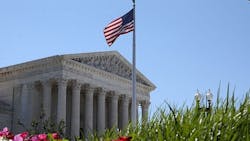Supreme Court Takes Up Issue of Mandatory Union Dues
WASHINGTON -- The U.S. Supreme Court agreed Tuesday to take up the issue of whether civil servants can be forced to pay dues to public sector unions even if they are not members.
The case could determine the very survival of public sector unions in America.
The plaintiffs are 10 teachers in California and a group called Christian Educators Association International.
They argue that the fact that they are being forced to pay union dues violates their First Amendment rights guaranteeing freedom of speech.
The court will hear arguments during its next session after the summer break.
The court's decision to study the issue does not seem to bode well for public sector unions: two previous rulings by the court already restricted their fund-raising ability.
Attorney Moshe Marvit, a labor law expert with the Century Foundation, said in January when the suit was first filed with the court that it could "decimate American public sector unionism."
Marvit said the case, known as Friedrichs v. California Teachers Association, aimed to overturn a nearly 40 year precedent and could be the most damaging to unions in decades.
Under that precedent, civil servants who do not wish to belong to public sector unions must still pay "fair share" fees to keep them from getting a free ride: enjoying the benefits of union representation without having to chip in and support the union.
Judge Samuel Alito, a conservative judge considered the court's biggest critic of unions and the one who wrote the previous two rulings that went against the courts, has been waiting for decades for a case like this new one, Marvit said.
The plaintiffs ave said their suit is "a challenge to the largest regime of state-compelled speech for public employees in the nation."
"Each year, the State of California compels its public school teachers to make hundreds of millions of dollars" in payments to unions, they say, calling this a violation of their right to free speech.
A decision in the case should come during the 2016 presidential campaign, in which unions will play a role.
Copyright Agence France-Presse, 2015
About the Author
Agence France-Presse
Copyright Agence France-Presse, 2002-2025. AFP text, photos, graphics and logos shall not be reproduced, published, broadcast, rewritten for broadcast or publication or redistributed directly or indirectly in any medium. AFP shall not be held liable for any delays, inaccuracies, errors or omissions in any AFP content, or for any actions taken in consequence.
